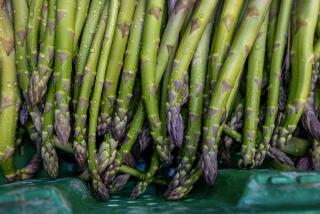Farmers Markets: Redlands’ Saturday morning gathering impresses
Redlands is one of the last agricultural zones left in the Inland Empire, and its Saturday morning farmers market — though overshadowed by its giant Thursday brother — is thriving. But while the Thursday market seems to be primarily a social event, dominated by prepared foods, music and crafts, the Saturday morning market features many small, local growers who sell in person and offer a good balance of basic and specialty produce.
Glencairn Farm, started by former mayor Bill Cunningham, offers excellent summer citrus, including Valencia oranges, Chislett navels, Redblush grapefruit and a few Variegated Pink lemons. His grandson Peter brings Lamb Hass avocados, a variety that ripens later than Hass and is better at this time from hot areas. He also has Goldmine nectarines, an old home garden favorite with tender, greenish-white flesh and rich flavor.
This is the home market for Robert and Patricia Poole, best known for their superb boysenberries at Hollywood and Santa Monica in June. They are also big peach lovers and this year have a splendid crop of O’Henry and Fay Elberta, as well as Satsuma plums and Kadota figs.
Mindy Kuhn and Jane Crawford of Sunnyside Local Produce beautifully display a dozen unusual heirloom tomato varieties, such as Goose Creek, Carbon and Missouri Pink Love Apple, with informative placards, and in single layers so they don’t get bruised. Rolling Hills Herbs & Annuals offers plants like Thai basil, peppermint and Egyptian hibiscus, whose magenta flower sepals are used to make a cooling drink.
One of the few sweet potato growers left in the Southland, Tom Archibald of T&D Farms, will start his harvest in about two weeks; meanwhile his grandson, Bren Medina, brings cucumbers, zucchini and cantaloupes.
All these stands are from Redlands itself. There is a refreshing paucity of the “usual suspects” from cookie-cutter farmers markets, although there are a few vendors whose offerings raise questions — abundant Fuji apples, all the same size, from a single tree (11 months after harvest!), and succulent celery from hot inland areas where that crop would wither in summer.
Also on Saturday mornings is a smaller farmers market started two years ago at the farm at the Grove School, a charter school flanked by old orange groves 2 miles west of downtown. Last weekend there were just half a dozen stands, most of them very local, small organic farms. For its rustic location and the purity of its vendor selection, it’s one of the most attractive markets in the Southland.
Abby and Jason Harned of Three Sisters Farm sell certified organic yellow straightneck squash, Moon and Stars watermelons, herbs and Siskiyou purple garlic. Produce-savvy locals make a beeline to the stand as soon as it opens, to get the best choice.
Working at the school’s farm is part of an education for its students, who have their own stand, which was tended last Saturday by Cody Hansen, a ninth-grader. He sold tomatoes, salad greens, zucchini and eggplant, all grown a carrot’s throw away in adjacent fields. Farmers market produce doesn’t get more local than that.
Redlands Saturday downtown farmers market, 8-11 a.m., Redlands Boulevard between 5th and 6th streets; Redlands Grove School farmers market, 8 a.m. to noon Saturdays, 11126 Iowa St.
State funding to be renewed
In the latest twist to a long-running saga, it now appears that funding for state supervision of the certified farmers market program, which had been scheduled to expire in January, will be renewed.
A measure to that effect, Assembly Bill 654, won’t boost resources for market oversight, like AB 996, which failed to make it out of the Assembly Appropriations Committee in late May. A fallback measure that would have continued funding at the current minimal level, SB 599, was “repurposed” by its author as a bill about parks. For a while it seemed as if the California Department of Food and Agriculture’s direction of farmers markets would shut down, at least temporarily, which would have been a setback for efforts to keep the markets free of fraudulent reselling.
Assembly member Isadore Hall III (D-Compton) learned of this problem in an article in The Times, he said. In late June he converted AB 654, a bill that previously concerned gambling, to restore funding for the state farmers market program.
AB 654 continues the status quo until Jan. 1, 2018, charging farmers $0.60 per market day. This will raise more than $200,000 annually to pay for statewide farmers market enforcement, databases and the expenses of the Certified Farmers Market Advisory Committee.
A hearing before the Assembly Appropriations Committee is scheduled for Aug. 12. AB 654 will need to pass both branches of the Legislature by Sept. 13 and be signed by the governor by Oct. 13. The bill seems likely to pass without controversy, Hall said.
Tip of the week: Paul Kolling of Nana Mae’s Organics will make his annual guest appearance at the Mar Vista farmers market this Sunday to sell Gravenstein apples grown in Sebastopol, where this high-flavored heirloom reaches perfection. He will also have new-crop Gravenstein applesauce and juice. His wife, Kendra, will offer her award-winning Sonoma artisanal grilled cheese sandwiches from a stand called, naturally, the Farmer’s Wife.
More to Read
Eat your way across L.A.
Get our weekly Tasting Notes newsletter for reviews, news and more.
You may occasionally receive promotional content from the Los Angeles Times.






